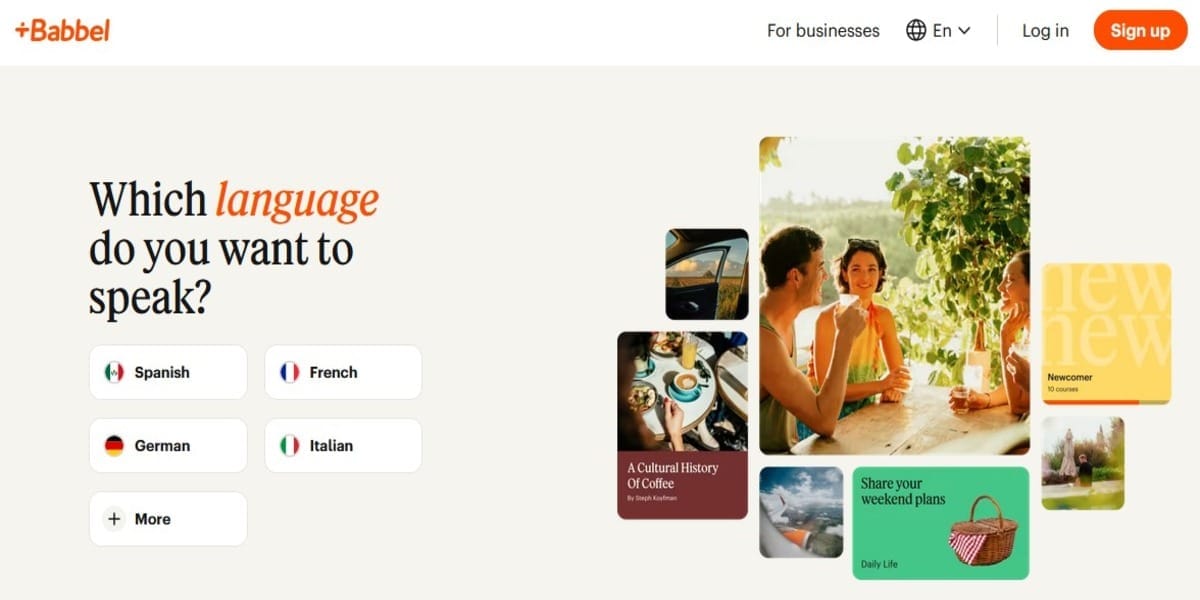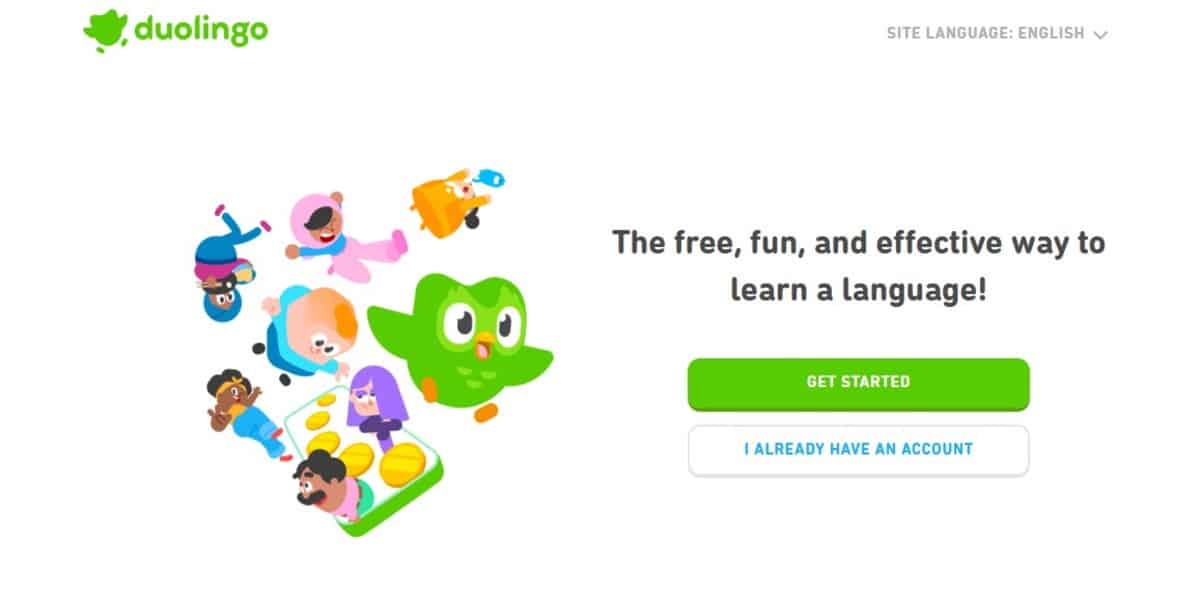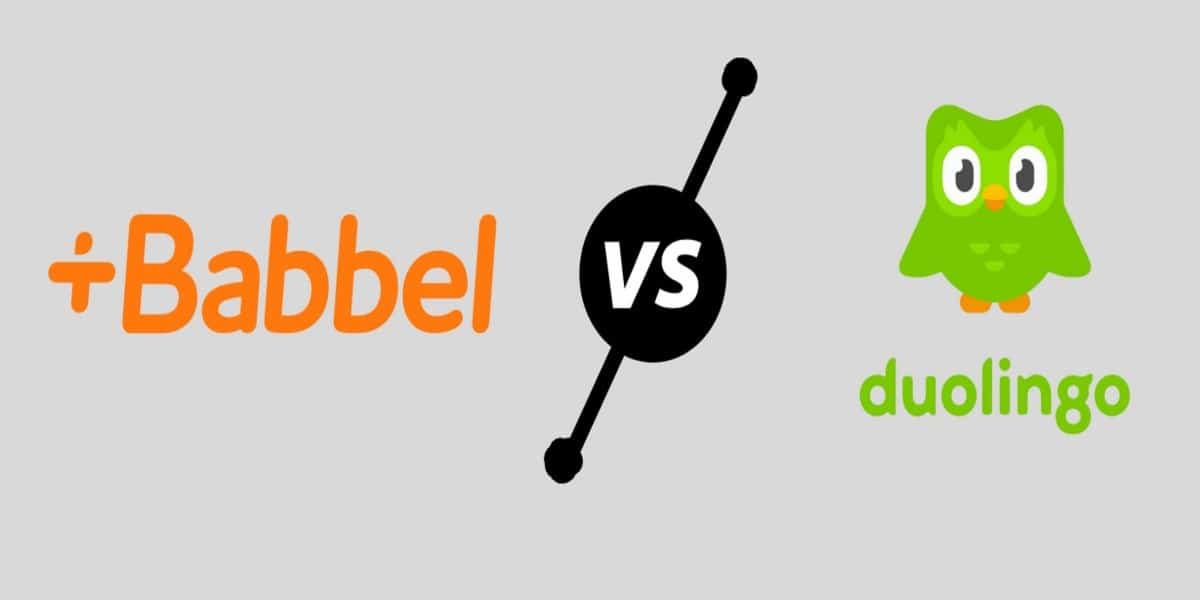We live in a fast-changing world, and major advancements have been made in how we learn languages now with apps like Babbel and Duolingo. Everything about their platforms innovates the way language learning, and the convenience of expanding one’s linguistic repertoire has never been easier or more engaging. Whether you want to freshen up on your Spanish before a holiday or just fancy starting from the beginning with Italian, these apps offer something for almost all learning styles and needs. Let’s go through a full Babbel vs Duolingo comparison to help you decide the right app for you.
An Overview of Babbel vs. Duolingo
Babbel and Duolingo stormed the scene of the best language learning apps and let users experience new languages while having fun in a respectful way.
Launched in 2007, Babbel is a German language learning platform that offers practical and conversation-based lessons. Courses are available in more than 14 different languages, including Spanish, French, Italian, and German. Babbel teaches conversation using real-life dialogues and practical vocabulary to get you to speak your new language in no time.
In contrast, Duolingo (founded in 2011) is one of the most downloaded educational apps worldwide and is also free for users. As for gamification, Duolingo is a bit more game-oriented, involving users who gain points and levels as they go through different exercises in their language of choice. Duolingo provides courses in 30 or more languages, making it a go-to language learning app.
Babbel features and options

Credit: babbel.com
Babbel is primarily targeted at structured, personalized language learning. The app also offers micro-lessons that are only 10–15 minutes long, which allows users to practice their language skills as part of their daily routine.
Babbel also uses speech recognition tech well, so the app can give immediate feedback on how your pronunciation improves. This can be a good way to practice speaking skills and grow in confidence with their conversational abilities.
This German app also provides various additional functionalities (e.g., Review sessions, Vocabulary lists, and Progress tracking) that help users to repeat what they have learned and stay motivated during their learning journey from day 1 till the end of the course. Powered by personalized course recommendations and adaptive learning algorithms, the app will show you content that aligns with your unique skill level.
Duolingo Features and Functionalities

Credit: duolingo.com
In contrast, Duolingo uses a gratifying style of language learning. There are virtual rewards for everything from getting a new high score in games to passing tougher vocabulary tests and sharing your progress with friends over social media (because no one will know how good you are at French unless it appears on Facebook).
The biggest advantage of Duolingo is its wide range of languages to learn—over 30 at last count, from more common languages like Spanish and French to ancient ones like Klingon and High Valyrian. The breadth of options available in Duolingo makes it appealing to language learners interested in a wide variety of topics.
There are also additional features in Duolingo beyond the basic language lessons, including stories and podcast episodes in different languages where you can practice reading comprehension or listening skills. Such capabilities make learning more fun and interesting while giving users extra means to practice using the language.
User experience and interface comparison for Babbel vs. Duolingo
Babbel and Duolingo have distinct tastes regarding the user experience and interface.
Babbel has a clean and simple interface that promotes organized, uninterrupted learning. The lessons in the app are incredibly well laid out and follow on from one another as it builds you up with exercises. Users also enjoy instantaneous feedback on their pronunciation through the built-in speech recognition feature.
Duolingo looks more colorful and game-like. It is visually appealing and has points, achievement milestones, and leaderboards for your progress, adding a little competitive aspect to learning your target language. In contrast, each Duolingo lesson is obviously more bite-sized and interactive, with different exercises, such as translation, multiple-choice, and fill-in-the-blank.
Language options and proficiency levels
Both platforms knock down discrete and specific customers and service a diverse audience of language learners, with Duolingo offering more languages than Babbel.
Babbel offers an iOS app with over 4000 hours of courses in 14 languages, including Spanish, French, Italian, and Russian Portuguese. The app offers courses from beginners to intermediate levels.
In comparison, Duolingo offers over 30 languages to learn, including widely used ones such as Spanish, French, and German, as well as the less commonly taught Klingon, High Valyrian, or Navajo. Duolingo language lessons are designed to suit any learner, whether a beginner or intermediate student, for any language the offer.
Gamification and Engagement
One of the biggest divergences between Babbel vs Duolingo is how each app approaches gamification features to draw users in.
Duolingo is a gamified language-learning platform and one of the most popular English-teaching apps globally. The app also has a social component, allowing users to connect with their friends and compete.
Alternatively, Babbel has a more traditional language learning approach with useful conversation-based lessons. While Babbel does have some light gamification, covering things like progress and review sessions, this app is more about a structured learning experience tailored to the individual.
Pricing and subscription options for Babbel vs. Duolingo
You’ll find different offers in terms of pricing and how you can learn a language, as both services offer more than 10 languages to choose from.
Babble is a subscription-based App that offers different pricing plans starting from $12.95/month per language. Prices are reduced for longer-term plans, too; a 12-month plan costs only $6.95 per month via the app.
Duolingo is a freemium app, and users have free access to language lessons when they use the ad-supported version of the service. Still, Duolingo has a premium subscription called Duolingo Plus that gets you ad-free learning, offline access, and the ability to finish “legendary” levels.
Users and their feedback and success stories
The apps Duolingo and Babbel, both popular tools for learning languages, have obtained countless good feedbacks with stories about how this method has really worked.
Many Babbel users talk about the app as a great, structured, and personally tailored way to learn. It also includes speech recognition software that helps teach better pronunciation. Some users say these lessons have boosted their confidence in speaking, enabled them to put some of what they learned into practice, and helped take the language out of the classroom.
Meanwhile, Duolingo users have claimed they are likelier to learn a language if it feels fun and play-like. Many users have reported that they can now speak a whole new language while traveling or pass their foreign proficiency exam.
Babbel vs. Duolingo: Final verdict
So, in conclusion, both Babbel and Duolingo are gigantic forces for adults to reckon with when it comes to learning another language digitally, and each has its own strengths. If you prefer a more gamified, socially interactive environment for learning many languages (including Klingon), stick with Duolingo. If practical conversation skills are your focus, or personalized learning paths based on experience and goals are what you need, then Babbel is the right app for you.
Both applications feature their own pricing schemes and a host of languages for users to select from, providing learners alike with comprehensive language learning tools available whether you want to learn a new tongue out of personal interest or professional need. Both are reliable choices for learning a new language, with plenty of user testimonials supporting their success rates among language learners globally.
For business owners of bloggers who need a helping hand with SEO, the Outreach Bee team is here for you. Contact us now to learn how we can assist you. Also, Feel free to leave us a message on Facebook or LinkedIn.



What is a DNS, and Why Do You Need One?
In Need of a Good VPN? Here is a List Based on Reliability, Speed, and Security